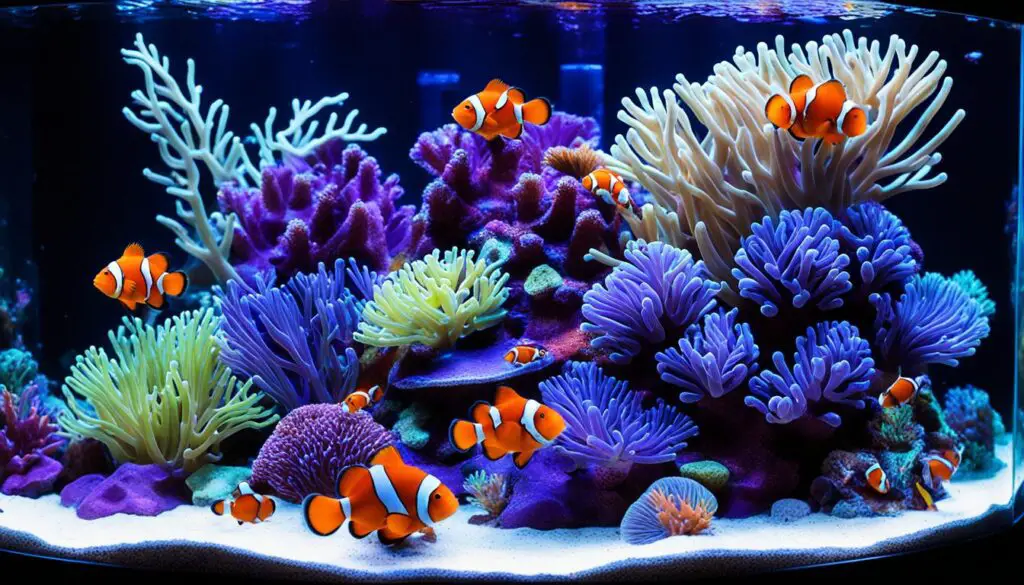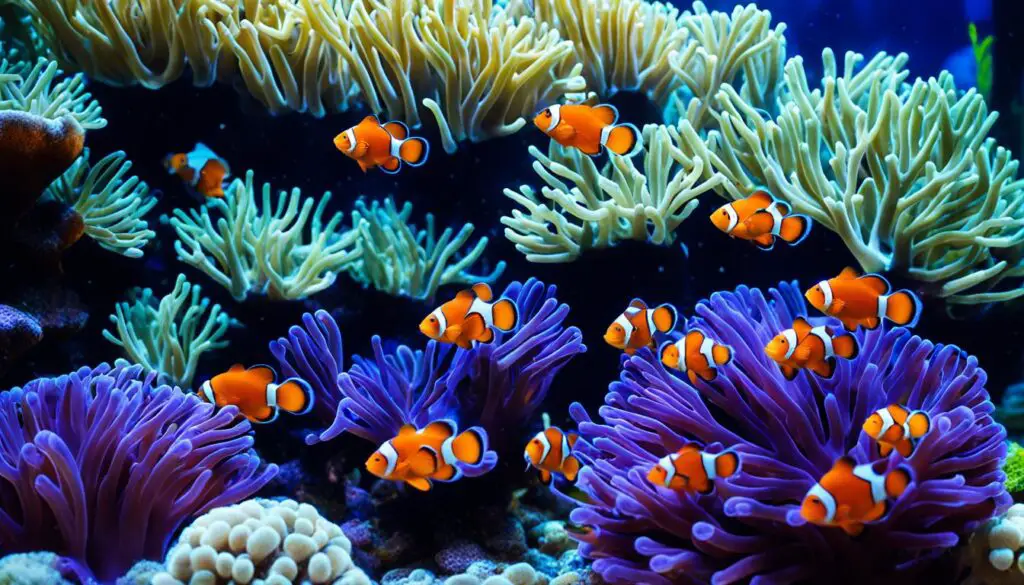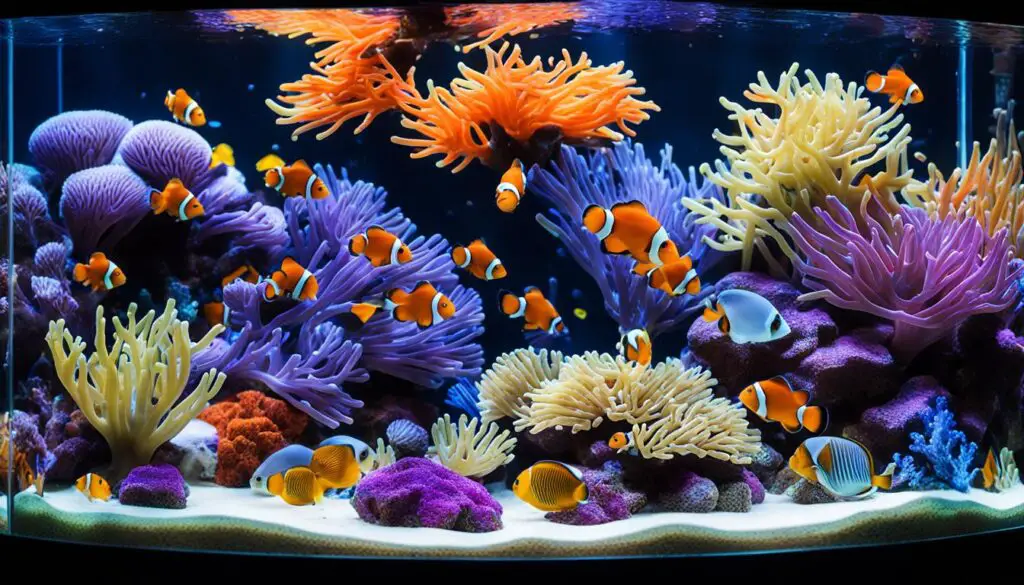Protecting Marine Life: Clownfish Tank Conservation Efforts
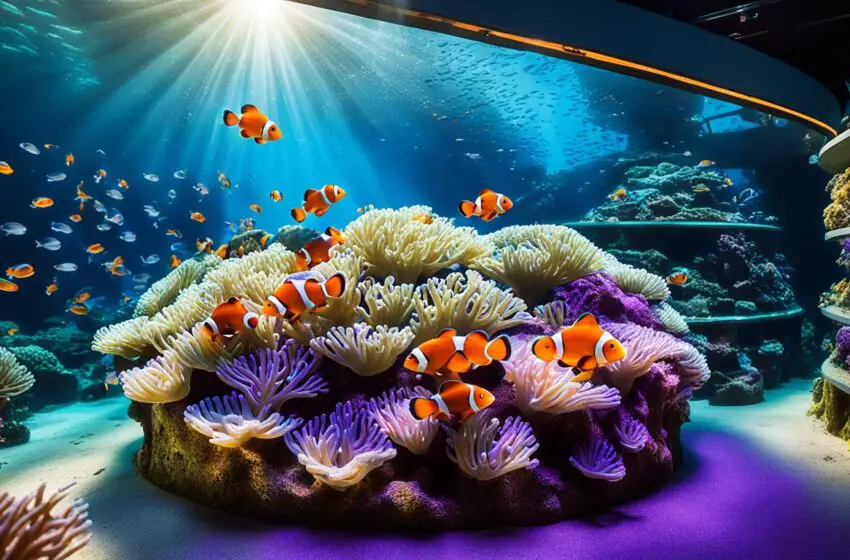
Clownfish, made famous by “Finding Nemo,” are unique and colorful fish. They face many threats to their survival. These include pollution, overfishing, and the effects of climate change.
As custodians of our oceans, we must step up. It’s up to us to spread the word and protect clownfish and their homes. This action is crucial for the future of all marine life.
Key Takeaways:
- Clownfish face threats such as habitat degradation, pollution, overfishing, climate change, and the aquarium trade.
- Raising environmental awareness is crucial for the protection of clownfish and their habitat.
- Together, we can make a difference in preserving the health of our oceans and the future of marine life.
- Reducing pollution, addressing climate change, and supporting conservation efforts are vital steps in protecting clownfish.
- Eco-friendly practices, sustainable fishing, and avoiding purchasing wild-caught clownfish for home aquariums can contribute to their preservation.
The Relationship Between Clownfish and Sea Anemones
Clownfish and sea anemones have a unique friendship. It’s a great example of how nature’s creatures help each other. This special bond amazes everyone who studies the sea.
They both need each other to live. Clownfish protect the sea anemones from dangers because of their bright colors and bold ways. This keeps the anemones safe.
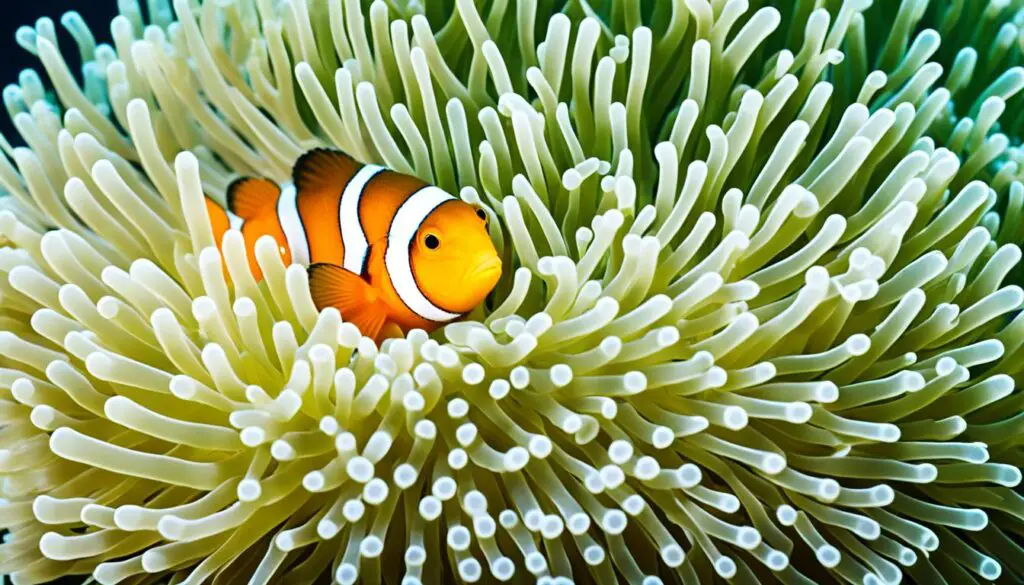
The sea anemones give the clownfish a home and a place for their eggs. With their venomous tentacles, they keep the clownfish safe from threats.
The partnership is not just about safety. It helps both the clownfish and the sea anemones stay well. Clownfish eat the anemones’ dead parts, which keeps them clean and healthy.
“The interaction between clownfish and sea anemones is a classic example of mutualism in nature. It is a partnership that showcases the delicate balance and intricate interdependence between different species in marine ecosystems.” – Marine Biologist A. Smith
This connection is crucial for the oceans. Clownfish support the growth of sea anemones, which are vital for healthy coral reefs.
To sum up, the friendship between clownfish and sea anemones shows the amazing ways life in the sea works together. It’s a key lesson in why we need to protect the ocean’s biodiversity.
Threats to the Survival of Clownfish
Clownfish, made famous by the movie “Finding Nemo,” are facing major threats to their survival. These include things like habitat loss, pollution, overfishing, and the effects of climate change. They are also harmed by the aquarium trade.
Habitat loss is a big worry for clownfish. They need healthy coral reefs and sea anemones for places to live and breed. But, due to activities like harmful fishing and coastal construction, these safe spaces are disappearing.
“The destruction of coral reefs through habitat degradation not only threatens clownfish but also numerous other marine species.”
Pollution is another big problem. Harmful chemicals, plastics, and trash in the ocean throw the ecosystem out of balance. This directly threatens the life of clownfish.
Clownfish are also victim to overfishing and the illegal pet trade. Because of too much demand, they are taken from the wild in harmful ways. This adds even more stress to their already struggling populations.
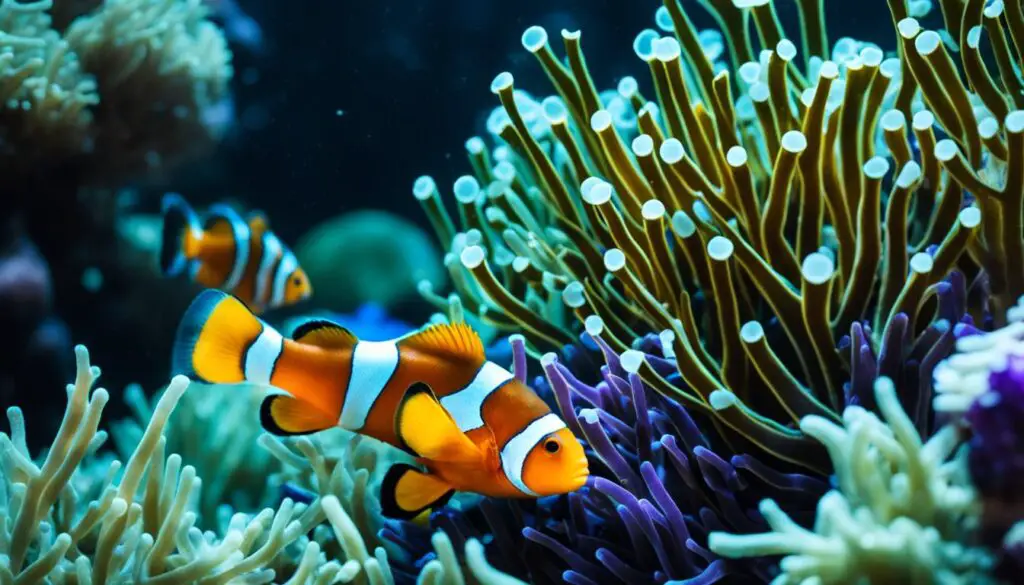
Climate change is hurting clownfish too. As the sea gets warmer and more acid, it’s harder for them to find suitable homes. They and their sea anemone friends are struggling to adapt.
We can help save the clownfish. By spreading the word about marine conservation, we make a big difference. It’s also important to fish sustainably, lessen pollution, and protect the ocean’s most vital areas. These actions are key to saving the homes and lives of these beautiful fish.
Taking Action to Protect Clownfish and Their Habitat
Protecting clownfish and their home takes everyone working together. It means caring about the environment. We need to use methods that are good for the Earth and back efforts to save these fish.
To start, we should lower pollution. This means using less plastic and choosing green options. Lessening our harm on the planet helps keep the ocean healthy for clownfish.
Creating marine areas where fishing is limited is key. These safe spaces are perfect for clownfish to grow safely. Also, it’s important not to buy wild fish for your aquarium. This can reduce the harm aquarium trade does to their numbers.
It’s vital to look after clownfish and their homes for the kids of tomorrow. Educating and highlighting ocean conservation’s importance can spur action. Let’s work together to protect these fish and keep our seas beautiful.
FAQ
How can I help protect clownfish in my own tank?
To start, make a healthy home for your clownfish. This means the right size tank with good filtration. Also, it’s key to pick clownfish that are bred, not caught from the wild. Finally, steer clear of chemicals that could harm them.
What are some eco-friendly practices I can adopt to help protect clownfish?
Want to help the environment and clownfish? First, cut down on plastic by using items over. Next, make sure your seafood comes from sustainable sources. Keep your cleaners eco-friendly and dispose of waste safely. Also, support groups that work to save our seas.
How does habitat degradation impact clownfish?
Clownfish need healthy reefs and anemones to live. But when these start to fade, life gets tough for the clownfish. They struggle to eat, hide, and make more fish. Saving their homes is crucial for their future.
Is it legal to keep clownfish as pets?
If they’re from a good source, yes. Look for fish bred by responsible breeders. Don’t buy ones caught from the wild. These steps help keep wild clownfish and their homes safe.
How can I raise environmental awareness about the importance of clownfish conservation?
Want to make a difference? Talk about the issues facing clownfish and our oceans. Post facts online and support local marine protection. Push for cleaner living and laws that shield the sea and its creatures.

